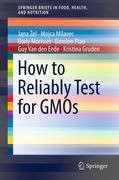
The detection of genetically modified organisms (GMOs) is becoming very complex, with new GMOs, approved and unapproved, constantly entering world markets.Traceability and labelling of GMOs is defined in regulations worldwide, demanding accurate and reliable testing to support the requirements of legislation.This Brief provides the current state-of-the-art on all key topics involved in GMO testing and is a source of detailed practical information for laboratories. Special focus is given to qualitative and quantitative real-time PCR analysis relevant to all areas where detection and identification rely on nucleic acid-based methods. The following topics, important for testing laboratories, are also discussed: organization of the laboratory, focusing on aspects of the quality system and methods for testing, validation and verification of methods, and measurement uncertainty. The Brief also discusses the new challenges of GMOs and novel modified organisms, using new technologies, and the possible solutions for GMO detection, including bioinformatics tools. Finally, legislation on GMOs and sources of information on GMOs are provided, which are relevant not only to testing laboratories, but to anyone interested in GMOs. The authors of this Brief have many years of experience in GMO testing, development of real-time PCR methods, implementation of quality system requirements, validations and verification of methods, and measurement uncertainty. The National Institute of Biology is a highly qualified research laboratory and a National Reference Laboratory, which also performs routine analyses of food, feed and seed.The Institute for Health and Consumer Protection of the European Union Joint Research Centre has extensive knowledge and experience of GMO detection. It hosts the European Union Reference Laboratory for GM Food and Feed in addition to chairing the European Network of GMO Laboratories. Concise guide to GMO testing. Includes detailed practical instructions forGMO testing. Discusses current issues in GMO testing. INDICE: Introduction. Legislation on GMO Labelling and GMO Detection. Organization of the Laboratory and Quality Management System. Methods. Verification of Methods. Homogenization and DNA Extraction. Real-Time PCR. Measurement Uncertainty. New Challenges. References. Index.
- ISBN: 978-1-4614-1389-9
- Editorial: Springer US
- Encuadernacion: Rústica
- Páginas: 100
- Fecha Publicación: 28/11/2011
- Nº Volúmenes: 1
- Idioma: Inglés
